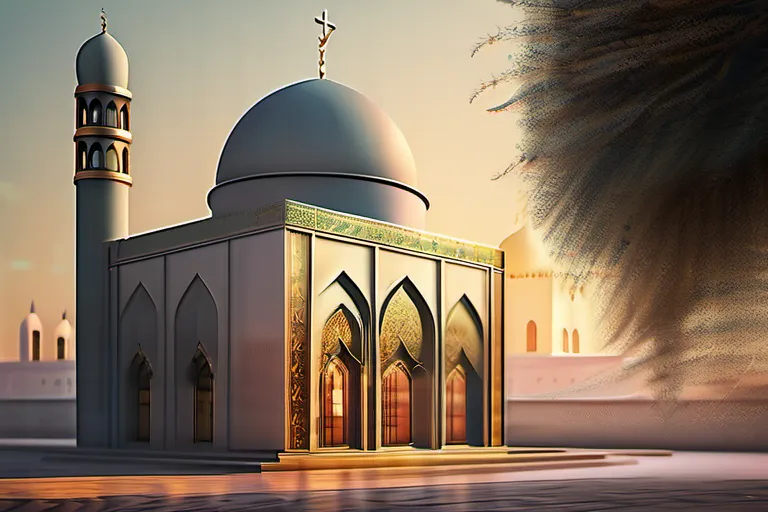Explore the key differences between Christianity and Islam, from beliefs to practices.
In this article, we delve into the unique aspects of two major world religions: Christianity and Islam. We’ll compare their core beliefs, practices, and historical contexts to provide a comprehensive understanding of each religion.
The Foundational Texts
When we delve into the foundational texts of Christianity and Islam, it’s like comparing two vast libraries, each containing volumes that have shaped the spiritual lives of billions. The Holy Bible serves as the cornerstone for Christians, much like a sturdy foundation supports a towering building. It tells tales of creation, deliverance, and eternal salvation through Jesus Christ, often referred to by Christians as their Lord and Savior.
In contrast, the Quran stands as the holy scripture for Muslims, regarded not only as a divine revelation but also a historical record of Prophet Muhammad’s teachings. The Quran’s structure is more concise compared to the Bible, focusing mainly on revelations received by Muhammad over a period of 23 years.
Both texts have their unique narratives and interpretations. For Christians, key stories like the Resurrection and the Baptism in the Jordan River are central, symbolizing redemption and spiritual rebirth. These stories are often depicted vividly in art and literature, making them deeply ingrained in Christian culture.
Muslims, on the other hand, center their lives around verses such as Surah Al-Fatiha, the opening chapter of the Quran, which is recited daily during prayer. This practice underscores the significance of the Quran in guiding believers through various aspects of life, from worship to moral conduct.
Interestingly, while both texts offer profound insights into human nature and the divine plan, their approaches differ significantly. The Bible often presents a narrative form that explores complex characters and events, offering a rich tapestry of stories. In contrast, the Quran is more straightforward in its verses, often delivering direct commands or descriptions of God’s attributes.
Both texts are not just read but also studied meticulously for their deeper meanings, with scholars over centuries providing detailed exegeses. It’s fascinating how these ancient scrolls continue to influence and shape the lives of people today, much like a well-worn book that reveals new layers with each reading.
Core Beliefs: Monotheism vs. Trinitarianism
When we delve into the core beliefs of Christianity and Islam, one of the most striking contrasts emerges: their approach to monotheism. In both religions, God is central, but how He is perceived varies significantly.
Is God One or Three?
In Islam, God (Allah) is described as a single, indivisible entity. The Quran emphasizes His unity with phrases like ‘there is no god but Allah.’ This belief in the oneness of God (Tawhid) forms the foundation of Islamic theology and practice.
But What About Christianity?
In Christianity, the concept of monotheism takes a different turn. Jesus Christ is recognized not just as a prophet, but also as part of a trinity: Father, Son, and Holy Spirit. This belief in the Trinity can be confusing for those unfamiliar with it, yet it’s central to Christian doctrine.
Imagine a symphony where each note is a unique instrument, yet together they harmonize into one beautiful melody. For Christians, God the Father, Jesus Christ (the Son), and the Holy Spirit are three distinct persons who coexist in perfect unity, much like the different parts of a song.
So Which Is It? One or Three?
The question often arises: Can both be true? For many scholars and faithful individuals, this tension is where the beauty lies. Both religions advocate for an absolute belief in one God, but their expressions of that belief diverge into unique theological landscapes.
Reflect on a time when you felt most connected to your faith—did it feel like a single, unified experience or did you sense multiple facets at play? The answer might depend on whether you’re exploring the depths of Christianity or Islam.
No matter which path you follow, understanding these core beliefs can illuminate your spiritual journey and help deepen your connection to both yourself and the divine.
Practices and Rituals
When exploring the unique practices and rituals of Christianity and Islam, one can’t help but wonder how these two major world religions differ in their daily observances. Let’s delve into prayer and fasting, two essential components that shape the lives of millions around the globe.
In Islam, Salat is a central pillar of practice, involving prostrations to God five times each day at specific intervals. Imagine it as a recurring symphony where believers harmonize their voices in prayer, seeking closeness with Allah. Each time they kneel and bow, they reaffirm their submission and gratitude. This daily routine not only strengthens the spiritual bond but also creates a sense of unity among Muslims worldwide.
On the other hand, Christianity has its own rich tapestry of rituals, with prayer being an integral part. Christians often engage in various forms of prayer, from silent contemplation to group worship in churches. One might ask, how do these different styles of prayer cater to diverse spiritual needs? Is it the repetitive chanting that brings Muslims closer to Allah, or is it the heartfelt dialogue with God through personal prayers that resonates more deeply among Christians?
Fasting holds a similar significance but takes on different forms in both religions. In Islam, the month of Ramadan becomes a sacred time when believers abstain from food and drink during daylight hours, reflecting self-discipline and devotion. This ritual is like a personal challenge to endure hardships with faith, reinforcing the values of patience and empathy towards those less fortunate.
In contrast, Lent in Christianity is a period of forty days where many Christians fast as a form of spiritual discipline. It’s akin to preparing oneself for Easter through self-denial and reflection on one’s sins. While both forms of fasting share the common goal of spiritual purification, their contexts differ significantly, reflecting unique cultural and historical influences.
As we compare these practices, it becomes clear that prayer and fasting are not merely religious duties but profound expressions of faith. They provide a framework for believers to navigate their lives with purpose and meaning. Which one do you find more compelling in its ability to inspire spiritual growth? The answer might lie in the heart and soul of each individual seeking enlightenment.
Historical Contexts: Origins and Spread
Imagine tracing back the origins of two major world religions, Christianity and Islam, as if you were uncovering ancient artifacts in a vast historical museum. Christianity began around 1st century AD, emerging from the teachings of Jesus Christ in what is now Israel. But how did this small Jewish sect grow into one of the largest religious movements in the world? The answer lies in its unique blend of monotheism and the new understanding of God’s role in human affairs through the life, death, and resurrection of Jesus.
Meanwhile, Islam took root about 600 years later, with the revelations received by Prophet Muhammad. But unlike Christianity, which spread slowly through trade routes and missionary work, Islam’s rapid expansion was fueled by military conquests and political stability under the caliphates. This rapid growth led to a global network of trade, learning, and cultural exchange that influenced not just religious practices but also art, architecture, and governance.
Both religions have left indelible marks on their landscapes: from the towering minarets of mosques in Istanbul to the grand cathedrals in Europe. The spread of Christianity through the Roman Empire’s vast network of roads facilitated a widespread distribution of religious texts and ideas, while Islam’s expansion across North Africa and into Spain brought about significant cultural and scientific advancements.
Reflecting on these origins, one can’t help but wonder how different the world would be if not for these pivotal figures and their teachings. The journey from humble beginnings to global influence is a tale of faith, conquest, and cultural exchange that continues to shape our modern world today. How do you think these historical contexts have influenced practices and rituals in both religions? And more importantly, what lessons can we draw from this expansive history for understanding the future interactions between Christianity and Islam?
Influence on Society and Culture
How has Christianity shaped society and culture, particularly in Europe and the Americas? And how about
In Western countries, Christianity’s influence can be seen in everything from legal systems to art and literature. The concept of human rights, often rooted in Christian teachings about dignity and freedom, has profoundly impacted modern governance. Moreover, Christmas celebrations and Easter traditions continue to hold sway over secular culture.
In contrast, the impact of Islam on societies like those in the Middle East is more visible through architecture, art, and even daily practices. The Quran‘s call for social justice and ethical behavior has influenced laws and social norms in many Muslim-majority countries. Islamic scholarship also contributed significantly to fields such as mathematics and medicine during its Golden Age.
Both religions have also played a pivotal role in cultural exchanges, with Christian missionaries spreading knowledge and arts far beyond their homelands, while Sufi orders of Islam fostered cross-cultural dialogues and spiritual growth across diverse regions.
But the influence of these faiths extends further still. The Crusades, for instance, were not just military expeditions but also cultural exchanges that shaped European views of the East. Similarly, the expansion of Islamic empires brought together different cultures and ideas, leading to a rich tapestry of shared traditions.
As we delve deeper into how these religions have influenced society and culture, it becomes clear that their impact is both profound and multifaceted. From legal systems and art to social norms and cultural exchanges, Christianity and Islam continue to shape the world in ways that are often taken for granted. How do you think your own understanding of these faiths has been shaped by their influence on society?
Modern Interpretations and Controversies
Have you ever pondered how two religions, both born from the same soil yet diverging so widely, can coexist in today’s world? Christianity and Islam share many foundational beliefs but differ significantly in their modern interpretations and controversies. Let’s delve into these aspects to understand what makes them unique.
Christianity faces a myriad of contemporary debates centered around LGBTQ+ rights, religious freedom, and social justice. How does one reconcile the ancient texts with the evolving societal norms? Take the question of homosexuality: while many Christian denominations condemn it, others advocate for inclusivity and love. This divide often leads to heated discussions within churches and communities.
Another significant controversy surrounds religious freedom in countries like the United States. Christians argue that their rights are being eroded by laws they perceive as infringing on their beliefs. Yet, counterarguments highlight the importance of protecting minority groups and maintaining a secular state. The tension between these views is palpable and continues to shape political landscapes.
Islam grapples with issues related to women’s rights, Islamic finance, and democracy in Muslim-majority countries. The role of Qiyas, or analogical reasoning, in modern legal interpretations is another hot topic. How do contemporary scholars apply this traditional method to address current socio-economic challenges? This question often leads to debates over the compatibility of Islam with Western-style capitalism.
The concept of Takfeer—excommunication for those deemed heretical—is also a contentious issue, especially in the wake of extremist groups. How do mainstream Muslims view this practice? Do they see it as a legitimate tool or a potential threat to religious harmony?
In both religions, these debates reflect broader societal changes and the challenges of integrating faith with modernity. Whether it’s the struggle for LGBTQ+ rights or discussions on women’s roles in society, these issues highlight the dynamic nature of religion in contemporary times. As we navigate these complex terrains, one thing is clear: the future of Christianity and Islam will be shaped by how they respond to these ongoing controversies.
Conclusion
 By examining the distinctive features of Christianity and Islam, we gain valuable insights into the richness and diversity of religious traditions worldwide.
By examining the distinctive features of Christianity and Islam, we gain valuable insights into the richness and diversity of religious traditions worldwide.











